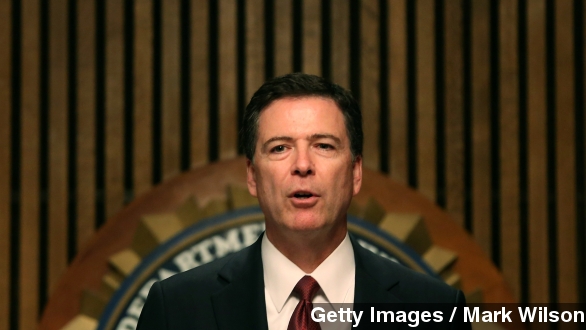Thursday, FBI Director James Comey became the latest and most high-profile official to call out both Apple and Google over their latest moves toward encrypting smartphones, saying the tech giants are making things harder on law enforcement.
If you hadn't heard, Apple announced that all user data would be encrypted on phones running iOS 8, and Google quickly followed, saying new versions of Android would do the same thing.
The big selling point: even the companies themselves won't be able to access your encrypted data, and therefore won't be able to hand that information over to government agencies. Law enforcement officials aren't happy about that.
Some of the blowback from law enforcement has been a little over-the-top. A Chicago police chief told The Washington Post, "The average pedophile at this point is probably thinking, I've got to get an Apple phone." And on Tuesday, a former FBI investigator, also writing in the Post, said the new privacy rules "will create needless delays that could cost victims their lives."
That last column was the target of many tech articles, which accused the author of getting his facts wrong.
One security expert said he's personally gained access to data on smartphones running iOS 8, and lots of forensics tools on the market right now can do the same.
Law enforcement site PoliceOne even published a guide that explains, in broad terms, how law enforcement can get past Apple's encryption.
So yes, maybe it's harder to crack a smartphone than it is to call up Apple or Google and get them to do it for you, but police are still able to do their jobs and execute search warrants on mobile devices.
Comey's criticism Thursday was a little bit different, though. He told reporters he's concerned with how the privacy change is being marketed. (Video via C-SPAN)
Comey said the tech giants are basically saying, "Buy our phone and law-enforcement, even with legal process, can never get access to it."
Apple's privacy page does specifically mention warrants, saying because the company can't bypass users' encryption, "It's not technically feasible for us to respond to government warrants for the extraction of this data."
But Comey also didn't shy away from the doom-and-gloom predictions of some of those earlier writers, saying, "There will come a day when it will matter a great deal to the lives of people ... that we will be able to gain access." (Video via FBI)
As you can imagine, privacy advocates took issue with Comey's statements, saying everyone is entitled to encrypt their data.
A national security professor told The Christian Science Monitor, "It's like saying you have to leave your door open in case we have an exigent circumstance and we need to search your house without a warrant."
And a writer for The Verge said, "It's hard to build a backdoor that can only be used by the good guys."
Comey said the FBI has contacted Google and Apple over how they're marketing the encryption changes. Neither company has commented yet.
This video includes images from Getty Images.


